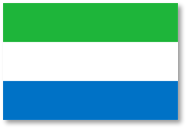
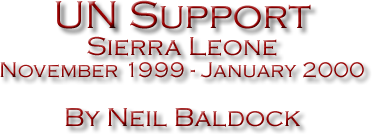
I always thought the New Year would be an over-rated event this year. The ideal place to be would be in a little hotel by the sea, watching the world go by. Little did I know that UKMAMS Ops now employ a mind reader!
Before the telephone rang on 19 November 1999 informing me of a little trip, I had never heard of Sierra Leone - 'where about in West Africa again?' The task, it turned out, was to advise on the Movements aspects for the deployment of a 4000 strong UN peacekeeping force into this war-torn area. Duration not more than 2 months, deployment date 3 December 1999. Pre-deployment training and more background information were to be gained on a UN course at Warminster. This turned out to be a valuable week and subjects such as personal security, conduct after capture and battlefield first aid were gone over in depth.
I was to be the only RAF person on the deployment and the only one who had ever done such work before. My team-mates turned out to be a Major from the Grenadier Guards and a WO2 Master Driver from 10 Regt RLC who were meant to be the Force Movement Planning Team in the HQ, and 5 Army movers from 29 Regt RLC at South Cerney who, along with myself, were to form the Airfield Support Team. After an armload of jabs, a mouthful of tablets, and a handful of kit, we left Heathrow at 0410 on 3 December for our trip to Conakry in Guinea, with Air France.
Before the telephone rang on 19 November 1999 informing me of a little trip, I had never heard of Sierra Leone - 'where about in West Africa again?' The task, it turned out, was to advise on the Movements aspects for the deployment of a 4000 strong UN peacekeeping force into this war-torn area. Duration not more than 2 months, deployment date 3 December 1999. Pre-deployment training and more background information were to be gained on a UN course at Warminster. This turned out to be a valuable week and subjects such as personal security, conduct after capture and battlefield first aid were gone over in depth.
I was to be the only RAF person on the deployment and the only one who had ever done such work before. My team-mates turned out to be a Major from the Grenadier Guards and a WO2 Master Driver from 10 Regt RLC who were meant to be the Force Movement Planning Team in the HQ, and 5 Army movers from 29 Regt RLC at South Cerney who, along with myself, were to form the Airfield Support Team. After an armload of jabs, a mouthful of tablets, and a handful of kit, we left Heathrow at 0410 on 3 December for our trip to Conakry in Guinea, with Air France.
Arrival at Conakry turned into a 'welcome to the system' check. You had to pay everyone for everything - from checking your passport to searching your bags - if you didn't it took twice as long. We were met on arrival by the outgoing OC Brit Con who guided us through the rest of the system and to our hotel for an overnight stay. The next morning we were taken to Lungi Airport in Sierra Leone by the UN's Beechcraft. The flight took about 20 minutes and ensured we landed in the hottest part of the day, so when we had to hump our baggage around it seemed to get heavier by the minute.
The UN's arrival system makes the RAF's look like a smooth operation - no-one we had to see was in, and you have to see everyone in a certain order - so, in true UKMAMS fashion, we gave up and went for a beer. There is a team of about 16 British military serving with the UN in Sierra Leone on observer duties; they all seemed happy to see us and our newspapers and charged us $30 to sleep on a camp bed in their house overnight. We arrived at Lungi Airfield 2 days later without doing a lot of admin; we did take the UN driving test on which I was asked to do a hill start on a flat road, and the driving instructor reversed into a stationary vehicle in the car park.
The UN's arrival system makes the RAF's look like a smooth operation - no-one we had to see was in, and you have to see everyone in a certain order - so, in true UKMAMS fashion, we gave up and went for a beer. There is a team of about 16 British military serving with the UN in Sierra Leone on observer duties; they all seemed happy to see us and our newspapers and charged us $30 to sleep on a camp bed in their house overnight. We arrived at Lungi Airfield 2 days later without doing a lot of admin; we did take the UN driving test on which I was asked to do a hill start on a flat road, and the driving instructor reversed into a stationary vehicle in the car park.
First impressions of Lungi Airport were of a warm welcome feeling from all the people, and a chance to learn the local greeting 'Givememoney'. The Airport had an old but workable infrastructure; indeed the tower had a real 1930s feel about it. Flight information was gained by looking out of the window and the weather report was to be the same as yesterday. They were not expecting us and there was no office or communication equipment available to us. The UN failed to provide us with transport, but as luck would have it the Kenyans had started their deployment without the British Mov Con present, and were more than happy to lend us a landrover. This was of course on the understanding we refuelled it, they of course knowing there was no petrol in Sierra Leone. They must have thought we had a personal supply in our Bergens.
After unpacking at our luxury hotel by the beach, which had put their prices up 50% 2 days before we arrived, we conducted a tactical assault on the beach. The local kids soon surrounded us, calling us "Porto's" (the word comes from Portuguese, the first white people seen in the area) and imitating everything we did. The same story was to follow every time we went for a swim and soon wore a bit thin. Water in the hotel was one of those hit and miss affairs; so was the electricity. As for the food, well it was to be shrimp curry and rice for the foreseeable future as that is all they had.
The first day at work we were met by an AN-124 already on the pan, shortly followed by an IL-76 and an IL-26. Contact was quickly made with the Ops offices of the charter airlines and the UN Charter office in New York, and we cobbled together some sort of programme, which was subject to a few changes as time went on. By the following Friday the UN saw fit to give us a diesel car, with the added bonus of air conditioning, and at last an office. On the 13th day we received our first UN allowance of $250. We were so excited we nearly paid the hotel bill, but couldn't afford to.
The UKMAMS part of the job entailed ensuring all concerned airport agencies were aware of the UN flow, that sufficient local labour was engaged to effect the bulk offloading of the contingent owned equipment, and the production and distribution of a flying programme. We also fully involved ourselves in the onmove of the troops to their deployment locations, using the in-theatre UN air assets of 2 x MIL-26 and 4 x MI-8, plus the routine movement of people on the helicopter schedules through Lungi Airport and the passage of UN 'new boys' through the terminal system from civil flights.
Riots in the ex-combatant camp near our hotel were commonplace, and they made it clear they knew where we lived. Indeed, they did demand money with violence on one occasion. Happy Christmas indeed! Christmas Day was spent on the beach under a palm tree, with a gentle breeze blowing and a few bottles of wine, not to mention the big crowd of locals standing around watching, asking for money or trying to sell you some fish. Still, as luck would have it, we had a few aircraft in so I had to go to work.. New Year's Eve was spent at a party in Freetown, where the night fighters started the January Sales early and still got no custom. The ride back to Lungi the next day was to be by a small boat; the Russian built MI-8s were grounded because of the Y2K bug - just in case they had a computer on board; the boat master ripped us off big style - we ended up paying $10 for a $2 boat ride; and everyone wanted to carry my really heavy day sack for another $5. Good job there were no telephones or I would have rung my MP.
The time was fast approaching for UKMAMS to leave the theatre of operations and after the last AN-124 departed, PJHQ gave the OK for my return home, via a place called Conakry, alone ... this was going to be expensive. The Army all stayed on to do their 90 days and get a badge. They were required for issuing fuel from bladders to helicopters and stacking frozen food into containers - it appears that the firm who were going to get the logistic contract were turned down at the last minute and the UN were to employ their own people. As this was not my specialised subject, they let me go.
The British Mov Con team were able to make a worthwhile and effective contribution to the deployment of the incoming UNAMSIL forces and their subsequent onmove to forward locations. The UKMAMS role within the team was valued by the UN staff and deployed team alike. A professional and personal challenge, the opportunity to make a positive contribution to a lasting peace in Sierra Leone made it all worthwhile.
The British Mov Con team were able to make a worthwhile and effective contribution to the deployment of the incoming UNAMSIL forces and their subsequent onmove to forward locations. The UKMAMS role within the team was valued by the UN staff and deployed team alike. A professional and personal challenge, the opportunity to make a positive contribution to a lasting peace in Sierra Leone made it all worthwhile.
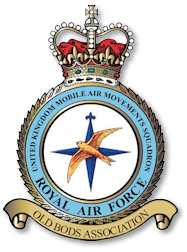

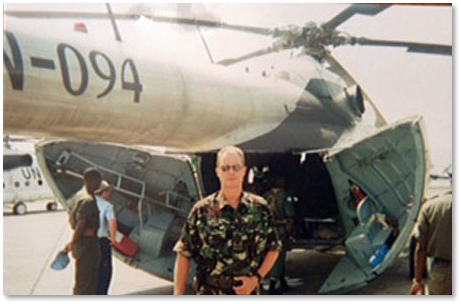
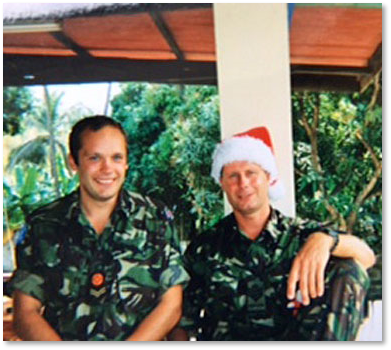
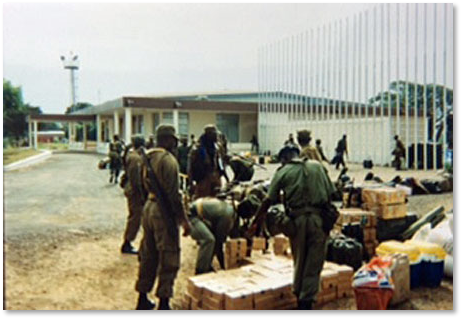
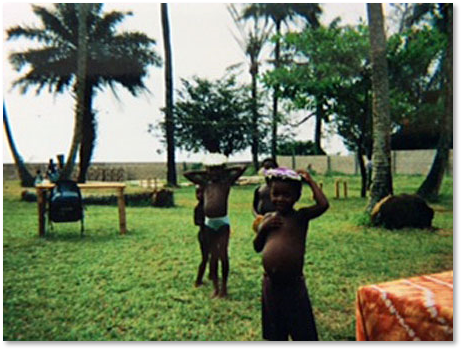
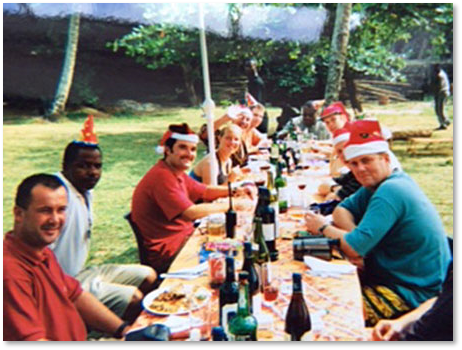
Sounds easy, but it was a battle to convince people that you really can only get 22 people on an MI-8 and no, they can't take 2 huge mortars, the cow and all the patio chairs they have collected. In addition, please try to cut down on the food and water, and no, you can't have it again later, it will be dark. Of course, it is your fault, and if they don't get the stuff their CO will be very upset.
Other battles revolved around head counts as the UN pay the Nation for the number of soldiers on the ground. On the first C130 Mk 1 from Nigeria, the chalk commander informed us that he had 120 men present. It did not look like 120 men so we did a head count, and came up with 74. I was informed that now the chalk commander would be in big trouble with his boss, and could I stay away from Nigerian aircraft please. Sounds like a challenge if ever I heard one! On a busy day we were handling 3 AN-124s and one 747 a day, with helicopters running in between and at the same time, and with most of the freight loose loaded.
Other battles revolved around head counts as the UN pay the Nation for the number of soldiers on the ground. On the first C130 Mk 1 from Nigeria, the chalk commander informed us that he had 120 men present. It did not look like 120 men so we did a head count, and came up with 74. I was informed that now the chalk commander would be in big trouble with his boss, and could I stay away from Nigerian aircraft please. Sounds like a challenge if ever I heard one! On a busy day we were handling 3 AN-124s and one 747 a day, with helicopters running in between and at the same time, and with most of the freight loose loaded.
We had a visit from the UK Deputy Foreign Secretary, Peter Hayes, in early January and had to put on a static TALO display using a MIL-26 helicopter (which is the same size as a Mk 1 Hercules), with 50 Indian Ghurkas and the Mov Con Landcruiser - all taped by the BBC and choreographed by UKMAMS. After the Minister left the sound of automatic gunfire rang out, very close to our location. The Major I was with thought it would be a good idea if we went to investigate! So, off we drove, to see about 200 Nigerian troops revolting and telling their OC 20 reasons per magazine, why they did not want to stay in Sierra Leone. They had done 3 years and were expecting to fly out that day. Their OC had just informed them that they had to stay another 3 months, and all that with no pay. I cannot understand some people; the UN was to blame as we asked them to stay, and as my vehicle was there it was my entire fault again. Time for a sharp exit.


